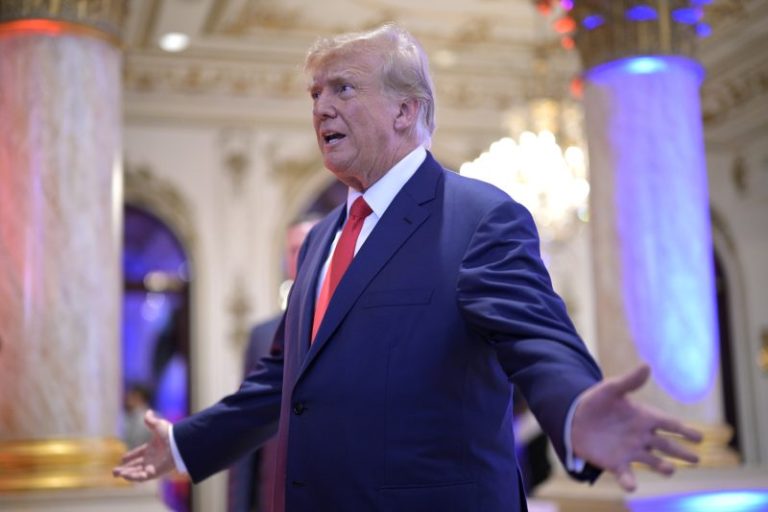A federal judge on Thursday fined lawyers for former president Donald Trump more than $66,000 and admonished them for filing frivolous and baseless claims in Trump’s defamation case against Hillary Clinton and her allies, stemming from the 2016 presidential election.
The fines levied by Judge Donald M. Middlebrooks, a President Bill Clinton appointee in the Southern District of Florida, include a $50,000 sanction to the court and an additional $16,274.23 payment to one of the 29 defendants in the case, Charles Dolan, for expenses he incurred as a result of the suit, which the judge dismissed in September.
The defamation suit accused 2016 Democratic presidential nominee Hillary Clinton and her allies of harming Trump with an orchestrated plan to spread false information that his campaign colluded with Russia. Middlebrooks, in dismissing the suit in September, had written that there were “glaring structural deficiencies in the plaintiff’s argument.”
Two of the Trump lawyers — Alina Habba and Peter Ticktin — signaled that they would appeal.
“We attempted to right a wrong, and our reward is a kick in the teeth,” Ticktin said in an email. “Ultimately, this will be decided by a panel of three judges of the Eleventh Circuit Court of Appeals, as we believe that the dismissal and the sanctions which followed will ultimately be reversed.”
The other lawyers, Michael T. Madaio and Jamie Alan Sasson, did not immediately respond to email messages from The Post.
The fines are the latest legal setback for Trump. Federal officials are investigating him for taking sensitive government documents after leaving the White House, and officials in Manhattan are scrutinizing the financial records of his sprawling real estate business. Last month a federal judge in a separate case said Trump signed legal documents that he knew included false voter fraud numbers
The fines also come as Republicans and conservative media outlets have openly blamed Trump for Republicans underperforming in Tuesday’s midterm elections, which Trump had hoped would demonstrate his electoral clout ahead of an expected announcement next week that he would run for president in 2024.
In the lawsuit, Trump’s lawyers had inaccurately described Dolan in court papers as a former chairman of the Democratic National Committee, a senior official in the Clinton campaign and a close associate and adviser of Clinton. Trump’s lawsuit also accused Dolan, a public relations executive, of helping create a “dossier” of false information intended to smear Trump.
In response, a lawyer for Dolan demanded that his client be removed from the lawsuit, noting in court papers that Dolan did not participate in the creation of the dossier, had never been a chairman of the DNC, and said that his role in the campaign was, as Middlebrooks wrote, “limited to knocking on doors as a volunteer.”
Clinton, through a spokesperson, denied even knowing him, Middlebrooks wrote.
Trump’s lawyers then amended their complaint but did not substantively change their claims about Dolan, the judge wrote. The amended complaint referred to Dolan as a former chairman of a “national Democratic political organization,” and a “senior Clinton campaign official,” Middlebrooks wrote. Criticisms about this amended complaint were “unheeded,” the judge wrote.
In levying the fines against Trump’s lawyers, Middlebrooks cited Rule 11 of the Federal Rules of Civil Procedure which, the judge wrote, is meant to deter “attorneys and litigants from clogging federal courts with frivolous filings.”
Middlebrooks wrote that penalties under that rule are necessary when a party files a pleading “that has no reasonable factual basis,” is “based on a legal theory that has no reasonable chance of success,” or when a pleading is filed “in bad faith.”
“Here, all three are true,” Middlebrooks wrote. Later, he added, “The pleadings in this case contained factual allegations that were either knowingly false or made in reckless disregard for the truth.”
As an example, Middlebrooks highlighted a detail presented by Trump’s lawyers that said Dolan was a resident of Florida. Dolan’s lawyer noted his client was a resident of Virginia and did not do any campaign work in Florida.
Trump’s lawyers responded, bizarrely, in the amended complaint that Dolan was a resident of New York and that “Charles Dolan is an incredibly common name, and Plaintiff’s counsel’s traditional search methods identified countless individuals with said name across the country, many of whom reside in New York.”

